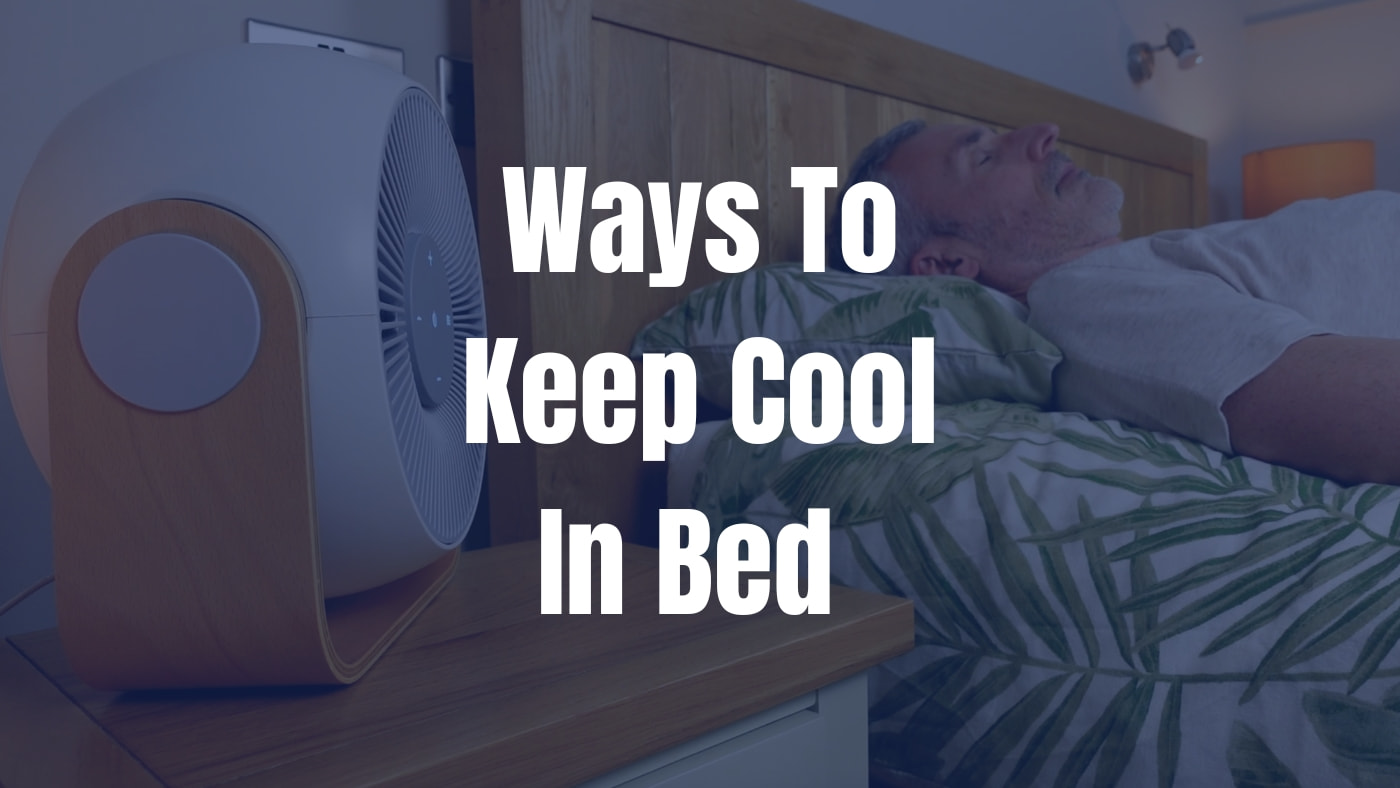
If you’re reading this, I imagine you’re familiar with the frustrating feeling of tossing and turning all night because it’s too hot to sleep.
It’s a feeling I know only too well, as I’m a hot sleeper myself and often struggle to drift off if my bedroom, bed, or body are too warm.
In this article, I’ll be sharing my tips to help make your bedroom feel more like a cool cave than a sweaty sauna. You’ll find some relatively simple and low-cost ideas that you can implement immediately, and some that require more planning or expense.
There are lots of tips, so I’ve put some of the main ones that I like to use myself in the infographic below in case you don’t want to read the entire article.
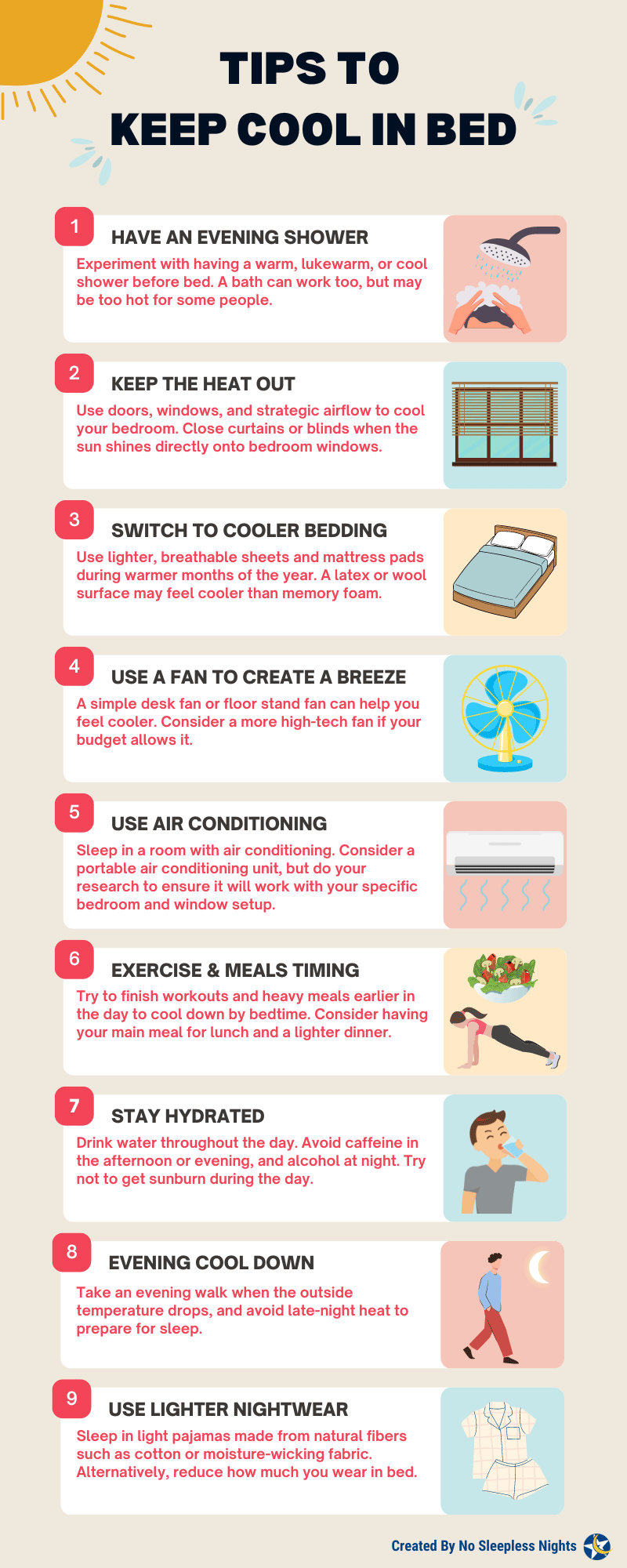
1. Have a shower before going to bed
Let’s start with one of the simplest techniques, and one of my personal favourites – have a shower before going to bed.
If you prefer to take a bath, research with older adults has also shown warm baths to be helpful for sleep. In my own experience, a hot bath is a bit too much before going to sleep though as it takes me too long to cool down again.
My partner and my sister are both fans of colder showers at night. Personally, I can’t think of anything worse than a cold shower when my plan is to relax, but they swear by it. A brief, lukewarm shower seems to work best for me.
My view is that this is an area to do your own research and experimenting. If you feel you relax and fall asleep quicker after a warm bath, stick with that. If a cool or lukewarm shower does the trick though, then that’s the one to add to your nightly routine.
Conceptually, having a shower or bath before bedtime may work well for several reasons:
- It might sound counterintuitive when your aim is to cool down, but warm water (or bedding) can increase vasodilation. This means increased blood flow in your extremities like the hands and feet, where heat can escape. It’s one of the main ways your body cools itself in preparation for sleep.
- A lowering body temperature is good for sleep, and we tend to fall asleep when our core body temperature is falling most rapidly.
- It can feel good to freshen up before getting into bed, and the bed can feel cosier when you’re straight out of the shower.
2. Use doors, windows, curtains, blinds and shutters to your advantage
Depending on how hot it is exactly, keeping doors and/or windows open (if you’re at home and feel safe) might be all you need to do to keep the house cooler, especially if it creates a breeze and lets the heat out. This is particularly effective if the air temperature in your home is warmer than the outside temperature, such as when cooking.
However, if you have curtains, blinds, or shutters, it might help to keep them closed when the sun is shining directly onto the windows of that room. This is a trick that many people in hot countries do as it can help reduce how much the sun heats the room up.
If your curtains or blinds are made of a dark colored material, however, they might absorb heat rather than reflect it. So it might help to change them for a light colored material to reflect the sun away from the windows. When I lived in Andalucia in Spain, it amazed me how many buildings, doors, and shutters were painted white. It was all about reflecting the sun, and it worked.
What you keep open or closed, and for what length of time, has to be balanced with your need for natural light and fresh air – especially if you live in a home that is very well sealed with little airflow when all the windows are closed. Venetian blinds can help with the need for daylight because you can adjust them to help reflect some sunlight away from the room, but still let plenty of light in.
As for keeping windows open or closed, the World Health Organisation advises opening windows and shutters during the morning and evening, but keeping them closed during the daytime on the side that the sun is facing.
To quote their article:
At night and early morning when the outside temperature is lower, open all the windows and shutters in your home. During the day, close the windows and shutters (if available), especially those facing the sun during the day.
World Health Organisation
Personally, I think some common sense is needed to decide which windows to keep open or closed, and for how long.
3. Open windows to create a cross breeze in the night
If you didn’t have all the windows open during the day, when the temperature drops in the evening open them to let some (hopefully) cooler air flow through your house and bedroom.
Try to create a cross breeze through your bedroom too. If you have two windows on opposite sides of the room, opening both will do that. If you only have windows on one wall, opening windows in an adjacent room and keeping the doors open to let the breeze flow through will work too.
If you have an upstairs, attic, or loft, open any windows or hatches up there to allow rising heat to escape.
4. Use a bed cooling system or breathable mattress pad
There are many mattresses, toppers, and pads that are marketed as being cooling. Most don’t contain any active cooling technology that requires electricity to work though, and are typically just made with more breathable or moisture-wicking materials.
Even that can help improve the heat buildup under your body though, and the ones that do have active cooling can make a big difference. Take a look at my review of bed cooling systems and pads to find out more.
If you currently sleep on a memory foam mattress or use a memory foam mattress topper, I recommend experimenting with a different surface if you can.
Memory foam is notorious for trapping body heat, so you might find some relief if you change or remove the mattress topper in hot weather, assuming the mattress underneath is still comfortable. If you have a guest bedroom that doesn’t have memory foam on the bed, you could also try that bed to see if it sleeps cooler.
If you’d like to try a more breathable mattress topper or mattress, perhaps consider latex or wool. Latex and wool tend to be more breathable than memory foam or plush toppers that contain polyester fiberfill.
5. Use a fan
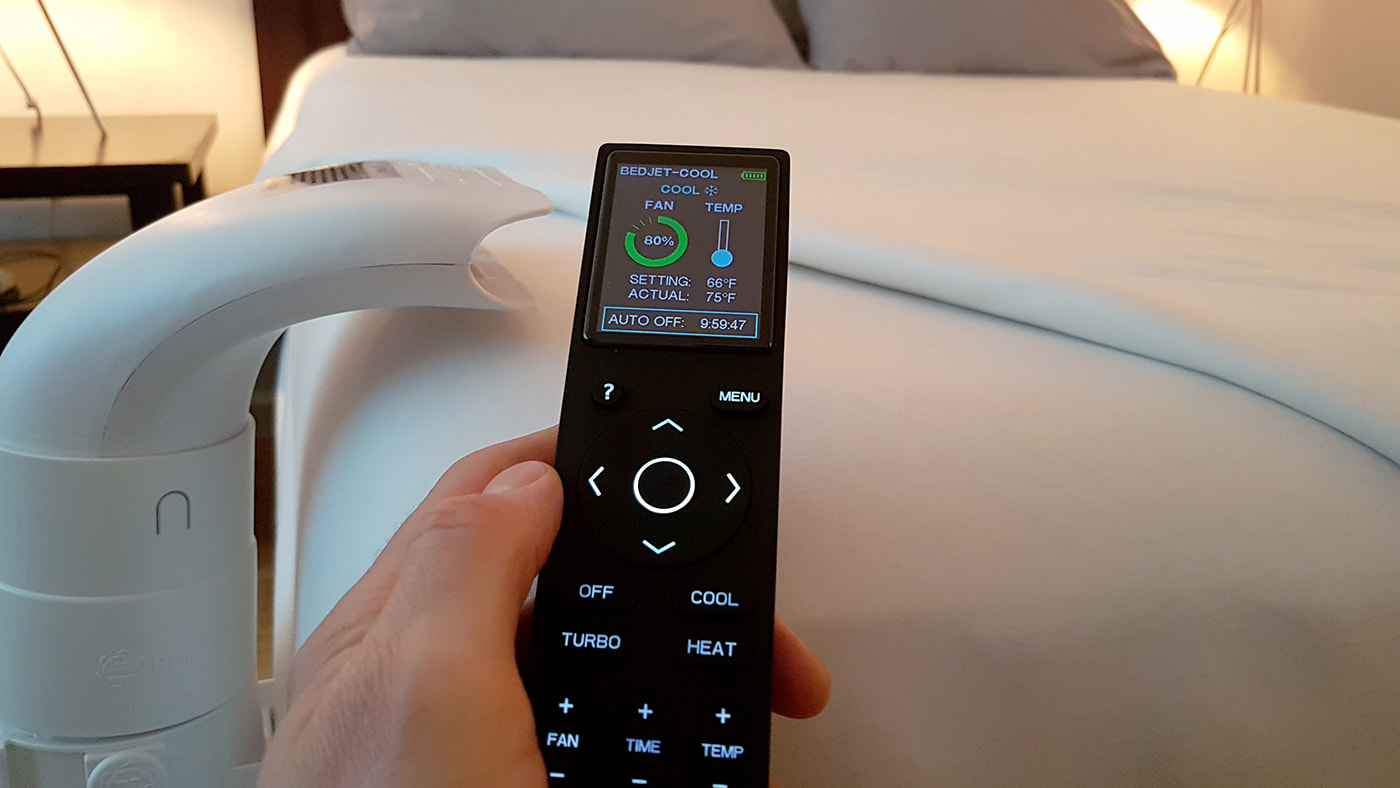
In the photo above, I’m using the BedJet 3. You can see how the remote allows you to choose the temperature and fan speed.
Fans can work wonders if you don’t mind the feeling of the air flowing over you. There are many different fan options to consider, which will depend on your budget and need for serious cooling.
You can use a normal fan and point it directly at your body, or even experiment with pointing the fan out of the window to blow warm air out of the bedroom. Even a basic and inexpensive desk fan can help a lot in hot weather.
If you have a bigger budget, you could install a ceiling fan above your bed. There are also some high-tech bedroom fans worth considering, such as the Bedjet 3 (see my BedJet 3 review). Another option is the Snooz Breez, which is a powerful smart fan that also doubles as a white noise machine (see my Breez review).
If you use a normal fan, try putting a container of ice right behind the fan. Another simple trick is to fill a couple of plastic drinks bottles with water and freeze them. Then stand them just behind the fan to cool the air it draws in and blows towards you.
Alternatively, just fill pans from the kitchen with ice and let the cool air that rises out of them get blown toward you by the fan. Keep an eye on the humidity levels in the bedroom if you try these fan + ice methods though, as high humidity isn’t ideal for sleep either.
6. Install air conditioning or try a portable unit
It can be expensive to install air conditioning in your home, but it might be a worthwhile investment if you live in an unbearably hot region. If you already have air conditioning, just not in the bedroom, try moving your bed temporarily in extreme weather to be closer to the unit.
When I lived in Spain and it would top 100° F for days on end in the summer, I used to cart my mattress to the living room every night, where it was always cooler.
If installing air con in your home is beyond your budget currently, there are plenty of good portable units you could use in the bedroom at night.
A good one will still be a bit of an investment, but it’s much cheaper than installing air con in a home that wasn’t built with it included. You can find them online and in large home improvement stores.
If you’re interested in air conditioning, I recommend doing plenty of research before you invest in it, and be sure that you can get a refund if you buy a portable unit in case it isn’t as effective as you hoped. It’s also important to understand that even a portable air conditioning unit needs proper ventilation, usually through a window.
One helpful overview article I recommend from the US is at Familyhandyman.com. Another good article can be found on the UK website homebuilding.co.uk.
7. Do exercise earlier in the day
Try experimenting with not doing intense exercise in the couple of hours leading up to bedtime if you’re able to do it earlier. It can take a long time for your body to return to its normal temperature, which might lead to you feeling too hot in bed.
Personally, if I go to bed at 10 p.m. in the summer, I try to be finishing up in the gym by 7 p.m. at the very latest whenever possible.
To be honest though, if I can’t make it to the gym until later, I still prefer the positive effect of exercise on my sleep, even if I have to go to bed feeling warmer than I’d ideally like to be. So I think this is one to test out for a few days to see if changing your exercise time has any effect.
If it’s a particularly hot day, avoid doing strenuous exercise outdoors if there are health advisories in your local area to do so.
8. Adjust your meals for hot weather
You might find you feel cooler in bed if you don’t eat a very large meal late in the evening. Digesting food raises your body temperature (especially large portions of meat). So it may be better to eat a big lunch and have a lighter meal or snack in the evening.
It might also help to eat cooler food like salads in the evening and avoid having the oven blazing away for long periods of time. If you can’t go without a bigger dinner though, perhaps avoid big steaks on the hottest nights.
On the topic of appliances, you might be able to reduce some heat in the home by keeping electrical appliances switched off if you don’t need to use them (not the fridge or freezer though, which obviously need to be on at all times).
9. Choose cotton or linen bedding
The material you both sleep on and have covering you can make a big difference to how cool you feel at night.
I recommend using bedding made from natural fibers, such as cotton or linen. It might also help to only sleep with a sheet covering you instead of any thicker bedding like duvets or blankets. Put the winter bedding away and keep it light in the summer, if you haven’t done so already.
Investing in high-quality bedding rather than cheap synthetic fabrics like polyester will hopefully mean it lasts longer too, which is also better for the environment.
Having said all that, there are high-quality synthetic bed sheets that are designed to be moisture-wicking as well, so it’s worth doing some research to see what might work best for you.
10. Cool your bedding before going to bed
Put your sheets in a plastic bag and pop them in the fridge for a while before going to bed. Then take them out and create a little fabric cooling cocoon.
I know it sounds a little odd, but it might help to keep you cool for just long enough to fall asleep. And as tempting as it is to think that freezing the bedding will feel even cooler, I find it can be too cold and irritate the skin.
11. Wear cotton nightwear
Try wearing light cotton nightwear rather than thick pajamas or synthetic materials. If you like the idea of breathable or moisture-wicking synthetic fabric, look for high-quality nightwear. And there’s always the option to sleep in your birthday suit!
12. Keep hydrated
Make sure you keep hydrated during the day and in the evening. Try not to drink alcohol, coffee, or other caffeinated drinks before bed. Keep a drink of water by the bed to sip during the night.
If you’re out in the sun on hot days, make sure you keep well hydrated too. Try your best not to get sunburnt: stick to the shade, wear a hat, and use sunscreen. It’s even harder to fall asleep on a hot night if you’re sunburnt from a long day at the beach.
I know only too well how hard it is to sleep when you spend a bit too long snorkeling on holiday, no matter how many gallons of aloe vera after sun you attempt to cure yourself with!
13. Allow some space between you and your partner in bed
If you sleep with a partner, keeping some space between you during the night rather than snuggling up may help you keep a bit cooler. Of course, not everyone has a big enough bed to leave lots of space between you, and it’s nice to have a cuddle when you first get into bed.
Even if you don’t, a little space for air to circulate might help rather than being two biological radiators welded together with sweat. If necessary, you could also try using separate bedding rather than sharing one cover if you have different temperature preferences.
And as much as some people might like sleeping with their pet on the bed, they are essentially four-legged hot water bottles. Great in the winter. Not so much in the summer.
14. Use a slatted bed frame
Using a bed frame that has slats rather than a solid divan bed base might help a little with temperature regulation. If you have a memory foam mattress on top of a solid bed base, you might get even more cooling mileage out of changing both.
15. Lower your body temperature before bed
Try to lower your body temperature before you go to bed. A falling body temperature is one of the signals your brain uses to produce more melatonin, which then makes you feel sleepy.
That’s one reason a shower before bed helps – even if it warms you initially, your temperature then starts to fall again when you get out.
It’s also the reason I personally avoid late-night exercise, and try to avoid being in a hot kitchen at night. I have a nightly meditation routine too, and I feel that helps reduce stress, which in turn stops me from feeling hot and bothered.
If your home stays warm but the temperature drops outside at night, getting outside for some fresh air before going to bed might also help. I’m a big fan of having a short (or sometimes long) walk in the evening, especially if I’ve been sat in front of my computer for hours. The cool nighttime air and natural de-stressing effect of walking are a good combo in my experience.
Reader suggestions
There have been some great suggestions from readers in the comments below, so I’ve started a list for future readers to check out. Thank you all for taking the time to share your ideas.
I haven’t added the ones about freezing items rather than cooling them in the fridge because of the risk it might present to some people’s skin.
I’d also be mindful of any ideas that involve adding lots of liquid to the area around the bed. Some research has shown that high humidity can have a negative impact on sleep.
- Cool some socks to wear in the evening.
- Eat a popsicle before going to bed (ideally sugar free).
- Put a cool towel on your head before and when in bed.
- Move your mattress to the floor because heat rises.
- Change your night clothes if you feel too hot.
- Wear as little as possible in bed.
- If you have long hair, tie it up to allow body heat to disperse better.
- If you can, put up a reflective or white shade on the outside walls that get the afternoon sun.
- Put some cold water in a jug or bottle in the fridge. Then put it into a hot water bottle to make a cold water bottle.
- Drape a cold cloth or flannel over a fan pointing at the bed.
- Sleep with your arms and legs stretched out.
- Use Aloe Vera gel to cool and moisturize the skin.
- Put a couple of drops of peppermint essential oil in a spray bottle mixed with cool water. Shake the bottle and mist yourself before going to bed.
- Do the tried and tested trick of turning your pillow and covers over if you overheat.
Further reading
If you’re experiencing a heatwave where you live, I recommend reading the World Health Organisation’s guidance for keeping cool during a heatwave. As well as offering advice for staying safe during the daytime, they also have some ideas for the nighttime.
Your ideas
Do you have any suggestions I haven’t included in this list? Have you tried any of the ideas here and found they did or didn’t work?
I’d love to hear how you cope with hot temperatures and what you think helps keep you cool.

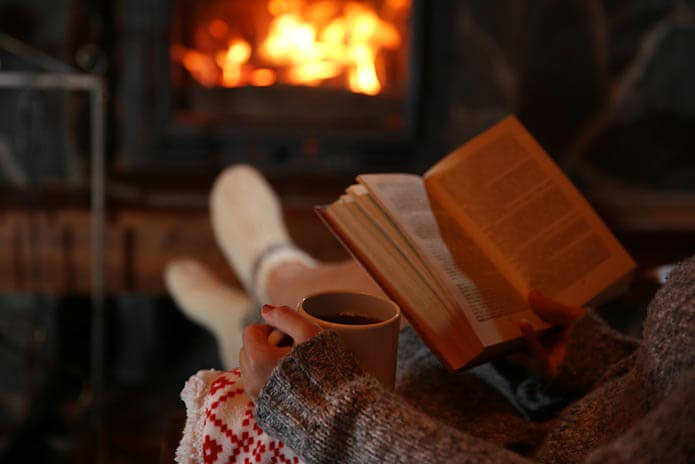
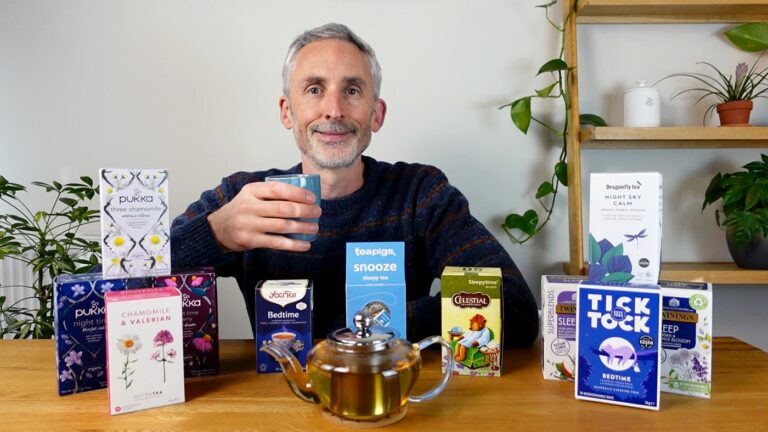
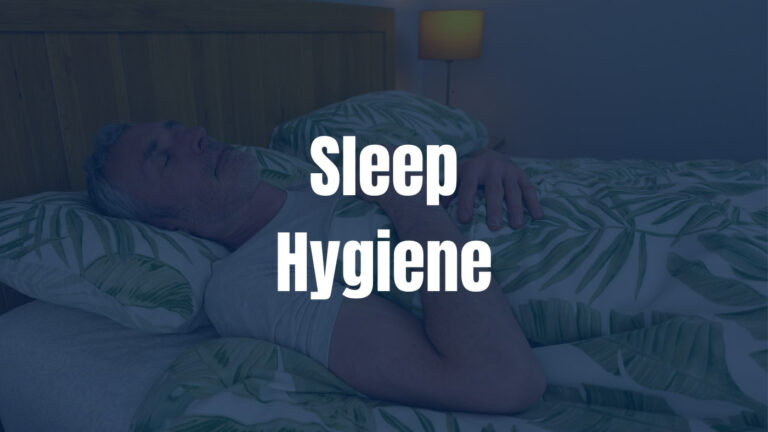

Hey! Have you tried sleeping without sheets with a fan blowing on you with the highest setting? It usually helps me fall asleep if I’m colder. But if it gets too cold, then you can put just the sheet back on. Or turn down the fan if you’re that desperate.
Sincerely,
Human
Hi Human
I have tried that, but I find a strong fan blowing directly over my whole body can be a bit much. Having said that, when I’m on holiday in a hot country and there’s a big ceiling fan, it definitely feels good sometimes!
Regards
Get a mini fridge and put literally any flat thing in there. When you’re warm, put it under your pillow or on your feet.
Thanks for the suggestion. I’m not sure a mini fridge is needed if you have a normal fridge you can cool things in though. I can also think of some flat things I wouldn’t put in the fridge, but I get your point. Flat fabrics and some other items can work well for sure.
True! Me too that really really helps with the fan and everything lol
Okay, I currently live on a 14th floor that has floor to ceiling windows. No windows open, only a sliding door. I’m sharing rooms with my son and he can’t ever fall asleep because his bed seems to be hotter than mine. This place is not ours, so it has black blinds and white black out curtains. We are on the bay, does the reflection of the water just increase to this? We are stuck here until the end of our lease in December. Please, help us figure out this solution.
Hi Zizi
Having lived on the 9th floor in NYC before, I can relate to this! We had air con, luckily, but I remember how insanely hot it got in the summer when we didn’t have the air con running because of the sun beaming through the windows and turning the apartment into a greenhouse.
I think your best bet will be to work on reflecting the sun when it’s shining into the windows, maybe by getting a better reflective material to test. Otherwise, a fan will help a lot while you’re trying to sleep, as might some of the other little tricks in the article.
Regards
Ethan
I was thinking of trying a cooling weighted blanket, assuming they themselves would add coolness, only to find they are lighter weight and made of materials intended to keep the body cooler. The best way I can cope is to freeze two large Blue Ice packages, wrap them in a thin towel, and hug away… plus a fan and a mister bottle. I survive, but not well.
Hi Deb
Thank you for your comment. You’ve spotted a common issue with the way some companies describe their products! I often talk about this in my articles and videos on YouTube, as I think it’s only right that people understand the word ‘cooling’ is used very creatively by marketing people. I am yet to find a weighted blanket that makes you feel any cooler than you were before you put it over you. My personal view is that some are more breathable than others, and more lightweight as you pointed out too. In the ideal world, all bedding companies would change their product descriptions to more accurate terminology like ‘lightweight’, ‘breathable’ or ‘more breathable than most’ rather than ‘cooling’. But I can’t see that happening because A) the word cooling clearly sells better, and B) they probably don’t want to fall behind by being the only companies that use more realistic descriptions.
So at the end of the day, it’s up to the consumer to filter out some of the clever advertising and see a product for how it really is.
I don’t know if you’ve seen it, but you might find my video and article about cool/warm weighted blankets an eye-opener.
Regards
Ethan
Hi i tried that last night and it helped a lot thanks.
How would you keep cool in a camper?
I live in a very nice fifth wheel with my family, and lately, I’ve been way too hot to sleep at night. I love full-time living in the camper, just can’t sleep while I’m burning up.
Hi Alayna
Here are some ideas that spring to mind:
– Use reflective shades on any windows the sun shines on.
– Park in the shade.
– Stay hydrated.
– Don’t cook inside the van or use too many appliances that give off hear.
– Don’t spend too much time in the van when possible as your own body will heat it up too.
– Get a portable fan.
– Use lightweight bedding and not a memory foam mattress.
Hope that helps!
Ethan
It really helps to go for a dip in the lake before bed, and drinking cold liquids and having a fan are my must-dos for camping!! Hope that helps!
I found what works for me is to have an cold shower for 10 minutes, use a couple humidifier fans with ice, water, lavender and eucalyptus oil in the tanks to cool down the air, put some damp + thin cotton sheets in the freezer for a couple hours and take an old fashioned sports injury ice bag to bed (make sure the bags a decent one though). That helps me get cool enough to get to sleep 👌🏻
Hi Julius
That is some serious dedication to the cause of DIY cooling in bed there – I love it:-)
If you had to rank those four methods in order of most effective, how would it go?
Regards
Ethan
I am lucky enough to have a water bed to help with back problems so I can turn it down but a cold water bottle on your feet works well.
So basically, I came up with this idea in the middle of a hot night. So, if you can, get undressed as much as possible… and then get a flannel/towel and rinse it under cold water until it is damp, NOT SOAKING! Then, put the flannel/towel over ur feet/legs and it cools your whole body down! I’ve got it on me right now 😂
Put a pair of socks in the freezer for an hour then place it in the fridge until bed.
Hi Tilly
Thanks for the tip. I do think it’s important to be careful putting frozen material directly in contact with the skin though.
Regards
Ethan
Just a special thanks for everyone
I have passed menopause already moved into our new home last October. Having problems sleeping. Its way too hot. I cant have the ceiling fan on me not a good idea. The open windows just seems like it doesn’t help either. Temperature gauge is a nest dont know how to use it came with the new house, no information for it.
Ok so I would try less bedding. what also might help is to dampen your sheets squeeze as most water out as you can and put it in the washer on the spin cycle. Hope you have a nice sleep!
I think it’s lovely and cool when I open the window. where I am it helps me breathe more bc I have breathing problems when I can’t breathe I try and and make it to the bathroom.
I have burning feet almost every night so it is impossible to sleep. Now l use the King Brand Unique BFST (blood flow stimulation therapy) foot wrap. It is a foot wrap. There is a compartment on the bottom of the wrap which you install a frozen ice pack under both feet. When l use these l fall asleep within minutes .lt works great. lt is a life saver. Just check on the internet under King Brand Unique BFST. This device can be used for heat or cold therapy.
Hi Don
That’s an interesting suggestion, thanks! I regularly have ‘hot feet’ when I get into bed, as I call it. When I do, I often get up and soak them under cold water in the shower for a couple of minutes, then get back into bed and leave them dangling out of the covers. It usually works wonders for me. I think cool or cold is probably better than frozen too, just to be on the safe side.
Regards
Ethan